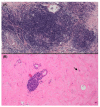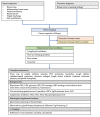Mastitis in Autoimmune Diseases: Review of the Literature, Diagnostic Pathway, and Pathophysiological Key Players
- PMID: 32235676
- PMCID: PMC7231219
- DOI: 10.3390/jcm9040958
Mastitis in Autoimmune Diseases: Review of the Literature, Diagnostic Pathway, and Pathophysiological Key Players
Abstract
Mastitis frequently affects women of childbearing age. Of all the pathological breast conditions requiring specific management, autoimmune mastitis is in the third position after infection and breast cancer. The aim of this literature review was to make a comprehensive description of autoimmune diseases targeting the mammary gland. Four main histological patterns of autoimmune mastitis are described: (i) lymphocytic infiltrates; (ii) ductal ectasia; (iii) granulomatous mastitis; and (iv) vasculitis. Our literature search found that all types of autoimmune disease may target the mammary gland: organ-specific diseases (diabetes, thyroiditis); connective tissue diseases (such as systemic erythematosus lupus or Sjögren's syndrome); vasculitides (granulomatosis with polyangiitis, eosinophilic granulomatosis with polyangiitis, giant cell arteritis, polyarteritis nodosa, Behçet's disease); granulomatous diseases (sarcoidosis, Crohn's disease); and IgG4-related disease. Cases of breast-specific autoimmune diseases have also been reported, including idiopathic granulomatous mastitis. These breast-limited inflammatory diseases are sometimes the first symptom of a systemic autoimmune disease. Although autoimmune mastitis is rare, it is probably underdiagnosed or misdiagnosed. Early diagnosis may allow us to detect systemic diseases at an earlier stage, which could help to initiate a prompt, appropriate therapeutic strategy. In case of suspected autoimmune mastitis, we hereby propose a diagnostic pathway and discuss the potential pathophysiological pathways leading to autoimmune breast damage.
Keywords: IgG4-related disease; breast lymphocytic infiltrates; granulomatous mastitis; mammary duct ectasia; mastitis; vasculitis.
Conflict of interest statement
This research did not receive any specific grants from funding agencies in the public, commercial, or not-for-profit sectors. Alexandre Maria received fees from Abbvie, Actelion, CSL Behring, Experf, Novartis and Shire and declares fees from Astra-Zeneca and BMS over the last 5 years. Radjiv Goulabchand received fees from Abbvie and Novartis. Alain Le Quellec received fees from Novartis and Shire. PG is a medical expert for LFB (Laboratoire Français du Biofractionnement) and has received fees from Abbvie, Actelion, Boehringer Ingelheim France, Bouchara-Recordati, Novartis, Pfizer, and Roche in the last 5 years.
Figures





References
Publication types
LinkOut - more resources
Full Text Sources
Other Literature Sources

